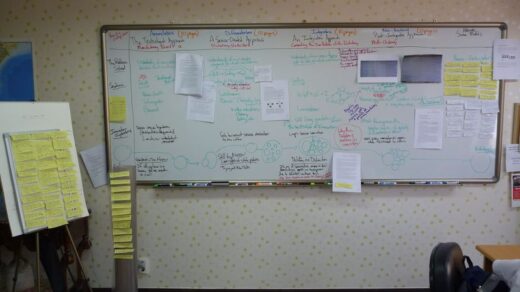I Ruffled Some Feathers
Back in June, I posted an article here about learning Korean and asserted that I’ve only mastered about 15% of the language even after spending over 15 years as a Korean language learner. I even went so far as to use this number as a key theme in a recent video about learning Korean:
I’ve been asked how I can claim proficiency in Korean and say I’m a decent translator if I admit that I still haven’t learned 85% of what is knowable about the language. This is a fair question and having taken this position a few months ago, I’ve put a lot of thought into it since then. I agree that it needs more clarification.
My First Effort at a Clarification
Here’s an online exchange I had with Ondrej Slecht, an associate over at Korea Business Central, and someone whose Korean ability easily qualifies him to ask the question:
Ondrej’s question:
I’d be interested in knowing more on how you got to the 15-20% figures.
I personally tried the following:
- number of words in a written text I understand
- number of words in spoken Korean I understand (news, movies, documentaries)
- percentage of actively/passively known hanja in a mid-size hanja dictionary (7000 characters)
- percentage of actively/passively known grammatical structures in a grammar dictionary
- accuracy of consecutive interpreting
- accuracy of simultaneous interpreting
Best regards
Ondrej
My answer:
Thanks for the question, Ondrej.
I should say, first of all, that there isn’t an objective way to measure this kind of thing. And it doesn’t mean I’m only 15% functional in Korean life. By 15%, I mean there’s another 85% that could be learned and improved, not only in terms of vocabulary and grammar, but also by just being able to make better use of what I know, and even through having a deeper understanding of Korean history, culture and literature.
So when speaking, I figure I have about 5-6 times as many ways that I can express myself in English as I have in Korean, thus the 15-20%.
Even on the simplest Korean words, phrasings and grammar, I often don’t know all the situations in which they are used. And I can’t connect them together as naturally and with as much nuance as I would in English. There’s no doubt I can write six English emails in the time I’d write one Korean one; probably many more!
If we were to look at it from a “reading” perspective, I estimate I’m about three times as fast of a reader in English than in Korean. So, even if you assume I’m picking up only twice as much of the meaning in English as I would in Korean, it still means I’m processing Korean at about a 15% level.
Frankly, looked at this way, 15-20% may be giving me a lot more credit than I deserve.
Ondrej’s reply:
I see now – so it is mainly based on the comparison of the way/speed the brain processes a native language as opposed to a second language learnt later in life.
This is truly particularly challenging in Korean as there are virtually no cognates (words that have a similar meaning/form across languages) from the perspective of an English speaker. The same goes for syntax and grammatical structures.
Let alone the fact that certain clusters of the vocabulary are difficult to capture for the native speakers too.
Then there is the “real” language usage which sometimes differs from what is presented in standard textbooks. As an example, I have noticed that there seems to be much higher variety of nuances in “real” usage of 하더라, 했더라, 했었더라, 하겠더라, 했겠더라, 했다더라, 했었다더라 then what is explained in standard dictionaries.
In fact, there are probably more exceptions than rules!
The basic idea is that there is far more to “knowing” a language than just memorizing words and grammatical constructions. It requires the ability to put all that together in the activities of speaking, listening, reading and writing.
Limited Brain Power and Its Perception
I would also say that the lack of fluency in a foreign language degrades one’s ability to express meaningful thoughts. I remember being at a seminar last year where a Korean expert on advertising was to speak to the audience of mostly expats. While his English would have probably been fine for a normal conversation, he chose to speak in Korean and let an interpreter communicate his meaning in English because he said that when he speaks in English, he sounds like an elementary school student.
I remember thinking about that statement after the meeting and realizing how aptly it applies to my ability in Korean. First, if I’m using 6X the brain power to express myself in Korean, it leaves that much less brain capacity to be insightful. Secondly, even when I have something profound to say, if my expressions in Korean don’t match up with what the audience things an insight like that should sound like, I’ll be perceived as having less to say than I really do. Unfortunately, I have felt both of these dynamics at work in my communications at university in Korea.
A Word About Translation and Fluency
As for translation, when I’m asked if I can understand a particular Korean written document, I always answer that it’s just a matter of time. Give me enough time and a dictionary, and I can get the meaning… just about all of it! But if it takes me 10X as long to fully grasp the meaning on a Korean passage as it would on an English passage, can I still say I’m as functional in both languages simply because I did figure it all out in the end?
I might also add that in the subject areas I generally translate, such as business, legal and technical, I’m much more proficient than in some others, such as literature, which I never translate. So if my 15% estimate is an overall level, it still leaves room for superior performance in specific subjects and skill types (i.e. reading).
Thoughts Regarding “Everything Else”
Another way to really understand how deep an understanding of a language fluency requires is to realize the historical and literary background of much of what we say. If we’re going out to a movie tonight but get there only to find it’s sold out, you might say, “Oh, I didn’t really want to see the movie anyway.” to which I’ll reply, “Oh, that’s just sour grapes.”
If you’ve memorized that “sour grapes” refers to a situation of saying you don’t want something you can’t have anyway, then you’ve understood the phrase at its shallowest level. If you were a good ESL student, you might have learned Aesop’s fable of the Fox and the Grapes. This would give you a bit more understanding. But if you really want to understand it at its deepest level, you would need to have studied about ancient Greece and the role of these fables in society both then and now. I don’t think many of us realize how much language is tied to our historical and cultural contexts.
Finally, knowing what it means when I say it is only one aspect of knowing it; to be truly fluent in this phrase, it will need to come to mind naturally in appropriate situations whether you’re speaking, listening, reading or writing. It’s this level of fluency that is only achievable to people who have learned a language from an early age.
We Don’t Normally Use It All Anyway
In day-to-day life, we don’t use everything we know anyway. I heard somewhere that although the average English speaker knows thousands and thousands of words, daily English usage only includes a small fraction of this. And even if a word comes along that one doesn’t know, the context often explains it. So it’s possible for me to be 90% functional in daily Korean life (especially if the Koreans I associate with speak “down” to me just a tad) while still not having mastered most of what can be known and used.
A Little Perspective from the Standardized Tests
I’ve taken a standardized Korean language test and scored near the top.
This test is written for foreigners learning Korean and Koreans taking it would probably find it extremely easy. (Just as I’m sure I’d be close to 100% on the TOEIC or TOEFL.)
But there is a Korean exam for Koreans:
I have no doubt that if I took this exam, I would score at the very, very bottom. Perhaps I’d get around, oh, 15%…
I’d Like Another 15%er to Tell Me I’m Wrong
So, I hope the above explanation helps to shed some light on my 15% statement. Perhaps I should have said that I’ve only “mastered 15%” of Korean, rather than “learned 15%”. But I don’t think it’s realistic for any English speaker coming to Korean later in life to expect to reach deep understandings of the language that are much higher than this.
I would be especially keen to hear back from non-Koreans who have scored respectably on the KBS 한국어능력시험 but who disagree with what I’ve written here. I have a hunch that almost anyone who’s actually gotten to the 15% level will share my opinions on most of this.



